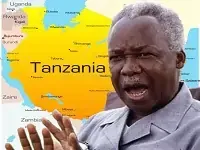Former Tanzania (Thanga Natka) is perhaps the only country in Africa
whose independence has not lost a single person, while the then British
government ruled the United Nations under Sir Richard Turnbull. The mutual
trust between African nationalist leader Julius Neri and Sir Richard Turnbull
proved to be a great help to black people in the peaceful handover of power
because of Nairi's character and personality. Freedom was possible without
bloodshed. He was an intelligent man who struggled with patience and
understanding to achieve his goal. When Tanzania became independent, he devoted
all his energies to the development of this new state, and soon the whole of
Africa recognized him as a leader with high political thinking, while he was
regarded as an excellent political leader. Began to go
Living conditions: -
The Nairs belong to a small and
somewhat poor (Zinki) tribe, living north of Lake Victoria. Many of his ideas
were formed in his tribal environment. Like other African tribes in the region,
the Zanki people treated other tribes equally and helped each other, and lived
according to their own principles. Adi was not a tribal chief until the
Europeans appointed a chief. He lived his early life in a mud hut and learned
tribal customs, history, and beliefs from his father. He became acquainted with
Roman Catholicism at a government school in Tabora, where he converted.
Political Struggle:
-
He started his political
struggle (Tanga Natka) by joining a group called the African Aisi Soviet.
Formed by local nationalists, he was appointed head of the group within a few
months. He later renamed the group "Tanu" and began the struggle as a
political party for a parallel government under a manifesto. The party had
little success in the early days, as the lack of roads in the country made it
difficult to spread the message, and many other educated people came out
openly because of government jobs. He was alarmed by the law banning political
officials from engaging in political activities. In 1954, a UN mission visited
Tanga Natka, after which Nairi raised the issue of Tanu. The members of the
mission were impressed by Neri's ideas, determination, and charming personality.
The mission also criticized the British administration in its report and set a
time frame for Tanga Natka's release. The report angered the
then-Governor-General of the United Kingdom, Edward Twain, but encouraged
Nair's cause. He went to New York in 1955, where he formally presented his
views to the UN Trust Council with a warning that he was welcomed by all
members, but Britain opposed independence and vetoed it. Opposed, so Nayyar
returned empty-handed.
After returning from New York,
he traveled around the country to support his ideas. The twins also began to
create problems for him, and finally, in 1958, Neri was arrested and prosecuted.
Meanwhile, Twain's term expired and new Governor-General Richard Turnbull took
power. Turnbull, Tanga Natka, and the majority were in favor of the independence
of the government, which only demanded from Nayyar that the people of Tanga
Natka should also accept it, just as Britain is slowly liberating its other
seats.
Less than four years after the
arrival of Turnbull, Tanga Natka was released. Before independence, legislative
elections were held, in which Neri's Tanu Party won 70 of the 71 seats and Neri
was made prime minister. A year later, within the Commonwealth, Nigeria was
elected president with 97% of the vote. When a military coup overthrew a
government in Zanzibar, the next government agreed to form an alliance with the
Nigerian government. In 1964, Thanga Natka renamed Tanzania.
With independence, Nayyar
focused on building a new nation with the same mindset, gradually rejecting
many British views of government and society, and relying heavily on African
resources. After much deliberation, he issued the Orsha Declaration in 1967,
which was based on the principle of equality, and to establish it on strong
foundations, he proposed African socialism. According to which the government
and the common people should work together for the betterment of society
instead of their personal interest and dignity. Focus on the development of
agriculture instead of industry, establish a village of farmers to ensure joint
cultivation of their lands, and hold one party accountable for political
decisions rather than competition between all parties, with which the alliance
And the brothers will prosper, they will depend on it. Save your resources
instead of foreign aid and investment.
Just as the role played by this
great Tanzanian leader in the development and survival of his country is
commendable, so nations develop only when they realize the power of unity,
while maintaining it while valuing independence. Try to keep The struggle never
ends, it is necessary to maintain unity and brotherhood forever.
Samia Hassan Soho is the first female president of Tanzanian
Existence of Black Community in Pakistan:








0 Comments